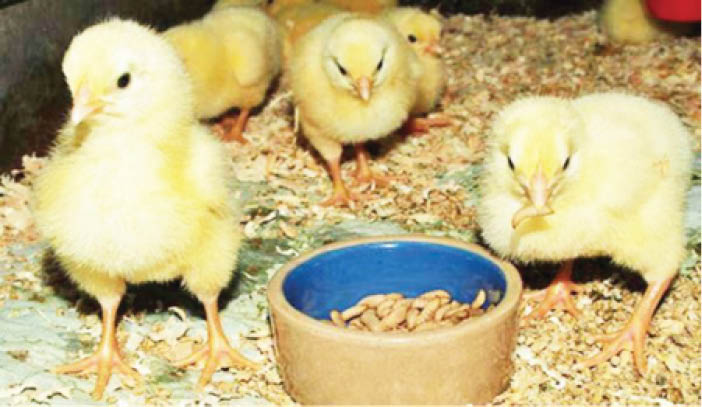Poultry farmers in dilemma over inputs cost
…stakeholders suggest solutions Poultry farmers across the country are in pains as the sub-sector faces one of the toughest moments due to continued rise in the cost of raw materials, feeds, and concentrates. This is being compounded by the continued closure of the hospitality sector due to COVID-19. The cost of grains such as maize, […]

…stakeholders suggest solutions
Poultry farmers across the country are in pains as the sub-sector faces one of the toughest moments due to continued rise in the cost of raw materials, feeds, and concentrates.
This is being compounded by the continued closure of the hospitality sector due to COVID-19.
The cost of grains such as maize, soybeans and other ingredients for specialised concentrate formulation have gone so high, forcing many feed millers to increase the prices of their feed brands, which is causing anxiety among farmers.
For farmers who produce their feeds, the high cost of maize and soybeans makes feeding the birds a heavy burden.
Last week, a feed manufacturer wrote to its customers alerting them of an increase in the prices of their feeds.
One of the feeds producers, in a letter dated 24th June, 2020, titled: “Raw Materials and Feed Price Challenge”, a copy of which was seen by this reporter, wrote to their customers notifying them of upward review in the prices of feeds and other additives.
“We sincerely hope that this message meet you well. Amidst the COVID-19 pandemic, is the current crisis in the livestock subsector of the Nigerian economy as a result of the skyrocketing cost of raw material inputs such as maize, soya and wheat offal occasioned by the negative effects of the ravaging pandemic on the economy. Other micro ingredients have also increased due to scarcity of foreign exchange.
“This has compelled most feed millers including us to review their prices upward and for some, just to cover a substantial part of their cost of production….we seek the understanding and the support of our esteemed customers in this current situation,” the letter reads in part.
Inputs market survey
In the last two months, the price of maize has gone up by almost 30% in certain cities across the country.
For instance, a price of a 100kg of maize that was sold at N12, 000 in March, suddenly went up to between N17, 000 and N18, 000, while soybeans also witnessed a slight increase from N10, 500 to N12,000 in June in some markets in Nasarawa State.
In some markets in states like Kano, Katsina, Kaduna and Plateau, the prices went up from N10, 000 to between N15, 000 and N16,000 depending on the size of the bag.
Smallholder poultry farmers who spoke with this reporter said it was difficult to make profit under the current situation.
“Hardly, you will find someone who will spend N3,000 to buy one broiler now. And if you sell less, you’ll even lose because a bag of feed (supreme brand) is now N3,850), and the same goes for Vital Feed.”
In some places, reports indicate that the shortage is occasioned by the lockdown and the sudden increase in the cost of transportation.
Farmers seek importation
The Delta State Chapter Chairman of the Poultry Association of Nigeria (PAN), Chief Alfred Mrakpor, has called on the Federal Government to allow importation to cushion the effect of the rising cost.
“The rising cost of maize is threatening livelihoods of small businesses in Nigeria. A tonne of maize which used to sell for N97,000 has climbed to N165,000 per tonne, while soybeans has increased from N110,000 per tonne to N123,000 within the last few months,” he said.
Tackling the problem
In a telephone interview with Daily Trust on the ways to solve the problem, the National President of the Poultry Association of Nigeria (PAN), Ezekiel Ibrahim, said the association was currently collating the aggregate demands of all members to assess the situation.
He said they had written to the Maize Association of Nigeria (MAAN) and the Soybeans Farmers Association of Nigeria to know what they have in stock for them to determine whether there is a gap or not before they can approach the authority for importation.
Mr Ezekiel said it would be premature to begin to ask for importation when an assessment of demand gap has not been done.
On his part, the National President of Soybeans Farmers Association of Nigeria, Professor Nafiu Abdu, said the price of soybeans has relatively remained stable in the last three months until the last two weeks when it witnessed a slight increase.
He said it has been between N10,000 and N11,000 for months, adding that soybeans is still available in the country.
He stressed that any importation would discourage the already 19,000 farmers under the anchor borrowers programme and many other private farmers going into the production.
Although the maize farmers’ association president could not be reached for comment, sources in the association, who preferred not to be mentioned, said there was grown maize in the country but pointed to transportation issues due to COVID-19 control measures.
An agric economist, Mr Daniel Okero, advised the Poultry Farmers Association and feed millers to write to the federal government to release some maize from the National Strategic Grains Reserve before calling for importation.
